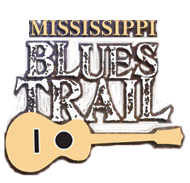Charlie Musselwhite
Charlie Musselwhite - Kosciusko
World-renowned harmonica virtuoso Charlie Musselwhite was born in Kosciusko on January 31, 1944. His great uncle, Lamar Coalson, once owned the store that occupied this site. Musselwhite began playing in Memphis and rose to prominence in Chicago, where he was befriended and mentored in the 1960s by many blues musicians who had also migrated from Mississippi. A perennial winner of blues awards and polls, he received a Mississippi Governor’s Award in 2000.
Charlie Musselwhite lived with his family at the corner of North and Wells streets in Kosciusko until they moved to Memphis in the fall of 1947, when he was three. He often returned to visit relatives here and in the Delta, and after he began headlining blues festivals in the area in the 1990s, he invested in property in Clarksdale.
Attracted to the blues as a teenager in Memphis, Musselwhite learned guitar and harmonica and sought out the blues singers he had read about in the book The Country Blues by Sam Charters (who later produced Musselwhite’s debut album). Will Shade, Furry Lewis, and Memphis Willie B. (Borum) became his first mentors. In November of 1962 Musselwhite moved to Chicago in search of employment, first settling in the Uptown area where many white southern migrants lived. He was soon immersed in the African American music and lifestyle of the South Side, however, and in 1964 he moved there to be closer to the blues. In 1963-64 he also roomed at the Jazz Record Mart and the Old Wells Record Shop with Big Joe Williams, one of many former Mississippians residing in the Windy City. Others, including Muddy Waters, Otis Spann, Big Walter Horton, and Magic Sam, also became close friends with Musselwhite, who later cited Horton, Williams, Homesick James, and John Lee Granderson as the bluesmen who taught him the most. He also acknowledged Little Walter and Robert Nighthawk as major influences.
As Musselwhite’s reputation grew as a performer in the blues clubs, Sam Charters invited him to record for the Vanguard label. His Stand Back! album of 1967 created such a stir, especially among audiences that were just discovering the blues as a voice of the ‘60s counterculture in California, that Musselwhite relocated to the San Francisco area in August of that year. A number of fellow Chicagoans including Paul Butterfield and Mike Bloomfield also made the westward move, as did Musselwhite’s friend John Lee Hooker from Detroit.
Although many white musicians had already adapted the blues into their country, rock ‘n’ roll, jazz, or folk music styles, Musselwhite always maintained a blues persona even while exploring a variety of American and world music genres. His trend-setting dedication to blues made him a role model, especially among harmonica players on the West Coast. Over the next four decades Musselwhite toured the world and recorded some thirty albums, many of which earned W. C. Handy Awards or Grammy nominations. When he and his wife, Henrietta, were married on January 26, 1981, in San Francisco, John Lee Hooker served as his best man.
content © Mississippi Blues Commission
[ BACK TO TOP ]

